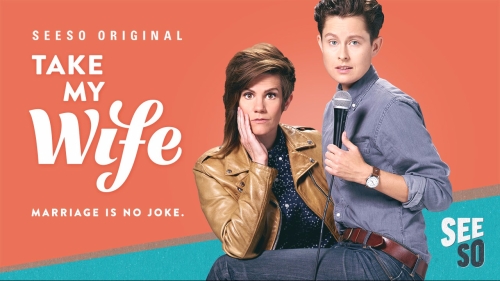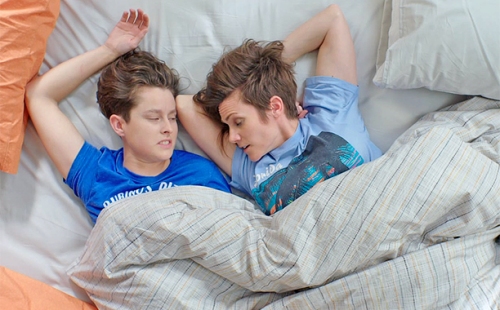October is LGBTQ+ history month, and I want to celebrate it by talking about the T.V. show, Take My Wife. Take My Wife was a television show on Seeso that focused on the marriage of two comedians, Rhea and Cameron (played by real life wives Rhea Butcher and Cameron Esposito). The show had an all female writer’s room, 43% of whom were women of color, employed LGBTQ+ actors in more than 47 roles in their second season, and actively sought out queer people in the industry to be a part of their production team. The show is considered one of the most inclusive T.V. shows available today. On August 9, 2017, Seeso announced it would be shutting down, throwing the fate of Take My Wife into limbo.

Photo courtesy of Seeso
I’m a huge fan of T.V. This started at a young age when I became captivated by the various adventures of those little guys on The Rugrats and continued when I heard my parents laughing in the living room while they watched Friends and Will and Grace. Anytime I scampered in to join in on the fun, they shooed me away, saying I was too young to watch and the beautiful people on the screen were just being silly. I started calling Friends The Silly People Show for this reason, and ever since I was (appropriately) censored from seeing it as a five year old, I have wanted to consume as many sitcoms as possible.
As I’ve gotten older and more pretentious, I’ve been drawn to more sophisticated stories that explore deeper, more complicated themes. However, I haven’t been able to shake my love for the sitcom. There’s something comforting about the genre, but I’ve become intensely frustrated by these shows’ lack of diversity. I’ve come to expect the same patterns when I watch these shows: predominately white, straight, and written by men.
Enter: Take My Wife.
Women write the episodes, the stars of the show are openly queer, and the supporting cast and folks behind the scenes are diverse in their race, gender, and sexuality. The aura of the show, unlike the shows I had grown used to, is completely inclusive. I had finally found a sitcom I could get excited about.
For the sake of time, I’m going to focus specifically on the pilot, which you can watch here. The show had me immediately after the opening. Close shots of everything in twos: toothbrushes, mugs, crusty cereal bowls. We are welcomed into the intimacy and warmth of our two main characters’ world. We don’t know how they came together, we don’t know how they came out, but we know that in this moment, they are together, and they are happy.
Except they aren’t quite happy, it turns out. Each are unsatisfied with various elements of their careers. They’re trying to find their rhythm, their balance. They face misogyny and failure and frustrations in the work place. Rhea practices her standup and gets continually interrupted by her needy boss, and Cameron eats soup alone in her car. They celebrate one another. They argue. They spoon.

Photo courtesy of ew.com
And that’s what makes Take My Wife so innovative: its normalcy. Rhea and Cameron play a couple pursuing creative careers. They miscommunicate, make mistakes, support one another, and manage to slip in some wacky escapades along the way. No one dies (sorry, that’s a spoiler I guess), the main characters aren’t made to feel morally compromised for their sexuality, and the show’s lack of toxic masculinity feels like a breath of fresh air. Sure, there are ways the show could improve, but it only had six episodes to find its voice. The fact that it succeeded in that venture in such a short amount of time is an indication that Cameron and Rhea and their team are on to something really great and innovative.
I think this show is important to highlight during LGBTQ+ history month because it does what few shows before it have done: it celebrates queer people, it celebrates diversity, and it doesn’t cast queer characters in the margins of the show as quirky sidekicks or characters fated for tragic endings. This is enormously important. I can’t help but think that if more stories like Take My Wife were on mainstream networks, there would be less fear and hatred surrounding queer people—less discrimination, more empathy. At the end of the day, what Take My Wife shows is that Rhea and Cameron are just two gals trying to navigate their careers and personal lives while remaining deeply in love and attracted to one another.
My love for T.V. remains as strong as it did back in the days when the sitcom remained a mystery to me. I think I love television so much because I believe it has the capacity to bring about real social change due to its ability to showcase the stories of so many different people. However, these diverse stories only get told when someone takes a chance on them. So take a chance on Take My Wife; get lost in the warmth and complexity of the world Rhea and Cameron have created, which reflects the lives that they live. America needs to see lives like these because, to me, they look a lot like hope.
Madeline Sneed, Intern
